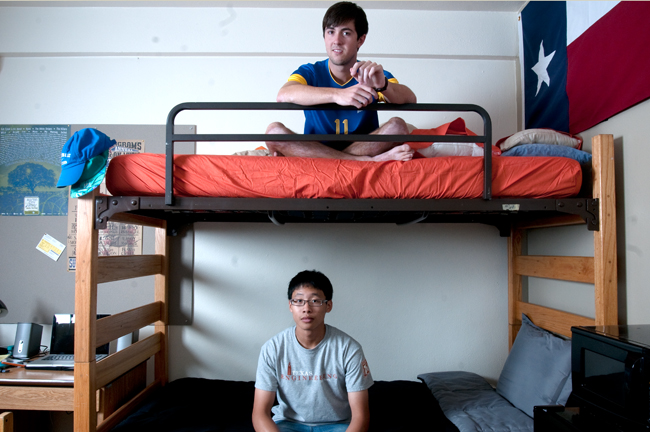For all 8,000 freshmen and other miscellaneous new students here at UT, the angst of arriving on campus is guaranteed to overwhelm even the soundest of minds. Separation from familiar environments is stressful even to people who experience it on a regular basis. All too often, a key component of that stress is sharing space with assigned roommates.
The loss of privacy, differing celebrity crushes, food allergies and spontaneous flatulence can drive a furtive wedge of frustration between even the strongest of friends, more so perfect strangers. And the yearly influx of macabre roommate horror stories perpetuates the need for vigilant floor monitors. At the UT Honors Quad, veteran residential assistants find solace and solidarity in the company of their emotionally maimed brethren. This peaceable, sequestered community of dorms, located north of the tower, is the final stop on a residential assistant’s tour of duty.
It is also the best place to find gritty tales from the front lines of disaster.
“There was duct tape in the center of the floor that went over the microwave and over the fridge, over the blinds, ceiling, over the door and back to the floor again,” said a three-year residential assistant who requested anonymity because of their job status, referring to a noteworthy instance. “And this was before these people had even met.”
So why put up with a random dorm assignment in the first place?
Considering the extent of roommate misfortune, it is easy to understand why some may not find value in the struggles associated with confined living space. Between the vaporized stench of unwashed clothing and uncomfortable disagreements over who devoured the last Pop-Tart, the silver lining may appear faint at first. Nonetheless, victors and victims of potluck residency are given the opportunity to develop the quintessential ingredient of any successful relationship: communication.
After the honeymoon phase wears off and the realities of dorm life settle in, the patience for early morning door slams and cheese-crusted microwaves vanishes. Even in cases where friends agree to share a dorm ahead of time, cohabitation is not made easier by a prior relationship. Just ask a newlywed couple: Dating and friendship take on a whole new meaning when they involve cleaning a communal toilet.
Thankfully, Dr. Phil always knows what to say: “Instead of just complaining, be specific about what it is that you want. No one’s a mind reader, so don’t expect your [roommate] to be able to figure out how you’re feeling.” Whether it’s voicing complaints, establishing rules or making concessions, communicating is a skill that must be honed in order for a relationship to withstand the tests of belligerent sleepwalking and compulsive hoarding.
In a more scientific light, roommates are a well-researched subject area for clinical psychologists. After moving away from parents and old friends, college students enter the final period of adolescent development ominously dubbed “trial independence,” according to Dr. Carl Pickhardt, graduate of UT and a local Austin developmental psychologist. Pickhardt explains that the ages between 18 and 23 constitute a time when young adults grapple with their sense of identity.
Other researchers have concluded that roommates in this formative stage can sway racial prejudices, drinking behaviors and even grade point averages, for better or for worse. New environments, though stressful, can also help break bad habits since they detach people from familiar cues that trigger them. By eliminating occurrences of pencil-tapping and cereal-slurping, no roommate should ever have the need to hire a social assassin, i.e. an uninhibited, verbal gunslinger who points out every perturbing habit, like Larry David from HBO’s sitcom “Curb Your Enthusiasm.”
The level of commitment involved when two or more people are confined to the same 200 square feet can forge either best friends or fervent enemies. Against all odds, Jake Hiebert, Plan II Honors freshman, and Kevin Chen, mechanical engineering and computer science junior, have thus far overcome the anxieties of living together as assigned bunkmates.
“Even if you’re roommate isn’t the greatest, at least you’re encouraged to experience life outside your dorm by escaping it,” Hiebert said.
Escaping, however, is in no way a component of their relationship. Within the first day of meeting each other, this textbook pair made sure to lay down basic modus operandi for the dorm. Dr. Phil would’ve been proud.
“No visitors when I’m trying to sleep, that’s all I ask,” Chen said while laughing.
Some smaller schools take a more active role in limiting the culture shock of dorm life and mitigating roommate catastrophes. From Reed to Dartmouth to Georgetown, colleges now profile individual students and match more compatible personalities.
Despite the sheer volume of residents moving in and out of the 40 Acres, this eHarmony level of finesse is possible even at UT. In addition, students living in campus residency halls are encouraged to sign “agreements” that clearly define the responsibilities of new roommates. While it’s in no way binding, at the very least it opens a line of discussion about keeping the room from the verge of destruction without requiring prodigious amounts of duct tape.
Roomate Dynamics from The Daily Texan on Vimeo.
Printed on Wednesday, September 19, 2012 as: Dorm life spurs maturity





















